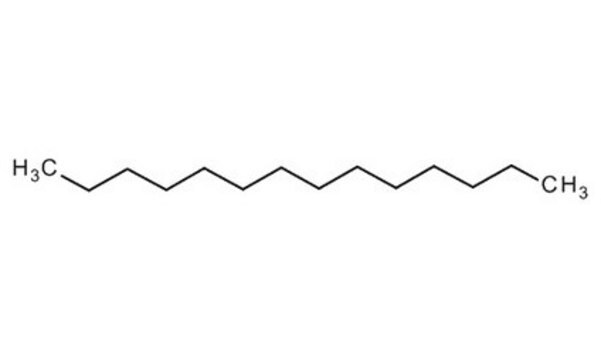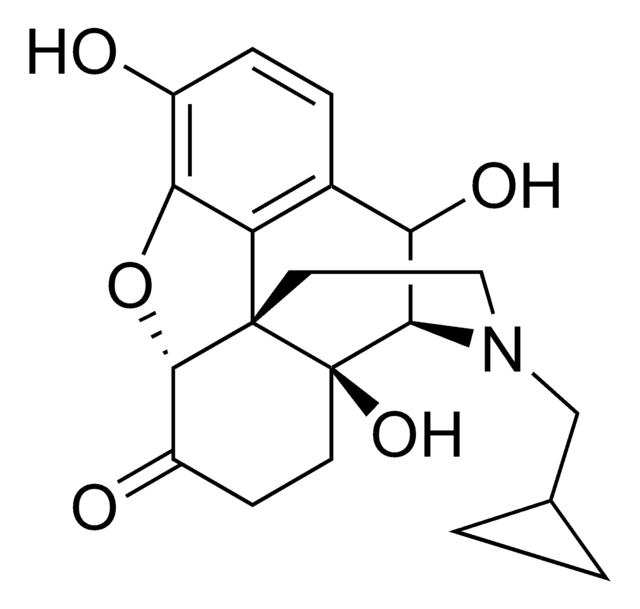About This Item
Recommended Products
grade
analytical standard
Quality Level
vapor density
6.83 (vs air)
vapor pressure
1 mmHg ( 76.4 °C)
description
olefine free
Assay
≥99% (GC)
autoignition temp.
455 °F
shelf life
limited shelf life, expiry date on the label
technique(s)
HPLC: suitable
gas chromatography (GC): suitable
refractive index
n20/D 1.429 (lit.)
n20/D 1.429
bp
252-254 °C (lit.)
mp
5.5 °C (lit.)
density
0.762 g/mL at 20 °C (lit.)
application(s)
cleaning products
cosmetics
flavors and fragrances
food and beverages
personal care
format
neat
SMILES string
CCCCCCCCCCCCCC
InChI
1S/C14H30/c1-3-5-7-9-11-13-14-12-10-8-6-4-2/h3-14H2,1-2H3
InChI key
BGHCVCJVXZWKCC-UHFFFAOYSA-N
Looking for similar products? Visit Product Comparison Guide
Related Categories
General description
Application
- Determination of seven volatile organic compounds in the surgically resected colonic tissue samples of colorectal cancer patients by gas chromatography-mass spectrometry (GC-MS) following their extraction by headspace- and direct injection- based solid phase microextraction (SPME)
- Measurement of concentrations of volatile organic compounds (VOCs) in biogas samples obtained from three different biogas plants by gas chromatography-mass spectrometry
- Simultaneous identification and determination of volatile organic compounds (VOCs) and semi-volatile organic compounds (SVOCs) from air samples using a styrene-divinylbenzene polymer particle and activated carbon particles based sampling device and GC-MS
- Development and validation of a thermal desorption method coupled with gas chromatography-mass spectrometry (GC-MS) for the determination of VOCs in biogas samples after their collection into inert film bags for sample treatment in multi-sorbent bed tubes
- Gas chromatography-mass spectrometry (GC-MS) method-based profiling of volatile organic compounds in the olive fruit headspace extracts
Other Notes
Signal Word
Danger
Hazard Statements
Precautionary Statements
Hazard Classifications
Asp. Tox. 1
Supplementary Hazards
Storage Class Code
10 - Combustible liquids
WGK
WGK 1
Flash Point(F)
215.6 °F - closed cup
Flash Point(C)
102 °C - closed cup
Personal Protective Equipment
Regulatory Listings
Regulatory Listings are mainly provided for chemical products. Only limited information can be provided here for non-chemical products. No entry means none of the components are listed. It is the user’s obligation to ensure the safe and legal use of the product.
FSL
Group 4: Flammable liquids
Type 3 petroleums
Hazardous rank III
Water insoluble liquid
JAN Code
87139-BULK:
87139-VAR:
87139-25ML:
87139-5ML:
Choose from one of the most recent versions:
Already Own This Product?
Find documentation for the products that you have recently purchased in the Document Library.
Customers Also Viewed
Protocols
Separation of Decane; Dodecane; Tetradecane; Hexadecane; Octadecane; Eicosane; Docosane; Tetracosane; Hexacosane; Octacosane
Our team of scientists has experience in all areas of research including Life Science, Material Science, Chemical Synthesis, Chromatography, Analytical and many others.
Contact Technical Service









